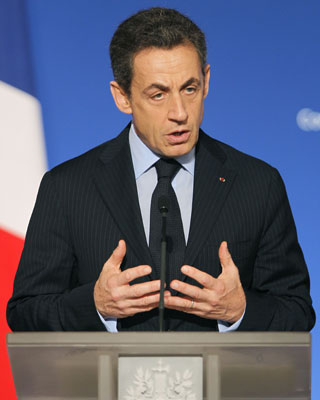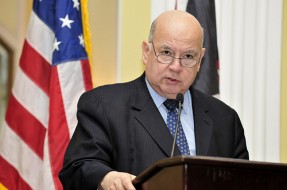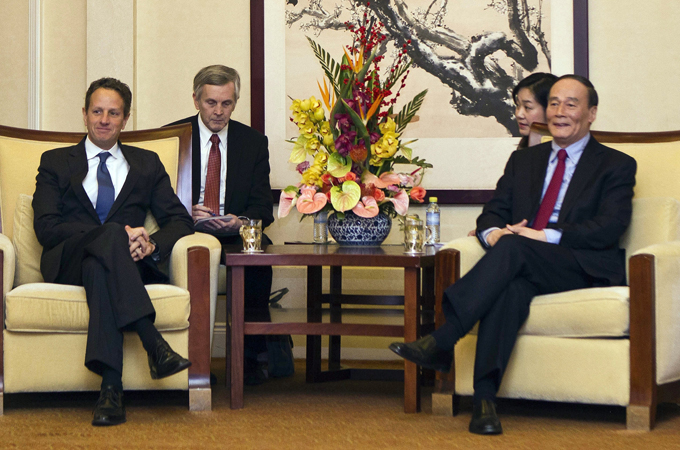Global
Por NATASHA BRERETON-FUKUI
Un espacio de reflexión sobre asuntos globales verbigracia la economía mundial, política internacional, el arte y la cultura.


La pesadilla de Sarkozy se ha hecho realidad: la agencia de calificación Standard & Poor's ha despojado a la deuda francesa de la sacrosanta Triple A, según avanzan varios canales de la televisión gala citando a una fuente del Gobierno. El Ejecutivo galo se ha negado a hacer declaraciones aduciendo que "no comenta rumores".
Hace un mes el presidente francés sacó pecho ante la posibilidad de que las agencias de calificación degradaran la matrícula de honor de la solvencia financiera gala. Aumentarían las dificultades, reconoció, pero no sería "insuperable". Aun así, a nadie se le ocultaba que perder la máxima calificación era la espada de Damocles que amenazaba sus posibilidades de presentarse a las presidenciales en abril con suficientes garantías de ser reelegido."Si perdemos la triple a estoy muerto", llegó a reconocer durante un receso en una cumbre europea.

Brasília - O governo brasileiro vai cobrar explicações da Argentina sobre a decisão de exigir a apresentação de Declaração Jurada Antecipada de Importação (Djai) dos importadores de bens de consumo. Essa exigência dificulta a entrada de produtos estrangeiros no país vizinho.
O Ministério do Desenvolvimento, Indústria e Comércio Exterior (MDIC) informou, por meio de nota, que a medida causa preocupação ao governo brasileiro e se comprometeu a acompanhar de perto o impacto da iniciativa argentina para o comércio do Brasil.
Todo podría suceder muy rápidamente, predijo hace dos años el economista Barry Eichengreen, de la Universidad de Berkeley, California. A comienzos del siglo XX, el dólar sólo necesitó diez años para pasar de ser una moneda regional sin importancia a una divisa mundial.
Y, según pronostica, lo mismo podría suceder en esta década con el yuan chino. “Si bien se puede especular aún cuándo eso pueda ocurrir –es decir, si Shangai se convertirá realmente en un centro internacional de las finanzas en 2020 y el yuan en una unidad monetaria internacional de primer nivel-, no se puede dudar en cuanto al rumbo que está tomando”, explica el experto. Hace unas dos semanas, el acuerdo entre Japón y China dio alas a su tesis.

Imagen: José Miguel Insulza | OEA en Flickr
El secretario general de la Organización de Estados Americanos (OEA), José Miguel Insulza, afirmó que no entiende la “porfía” de Gran Bretaña de enviar barcos con bandera de las Islas Malvinas, cuyo ingreso fue vetado recientemente por los países del Mercosur.
“Nunca he entendido la porfía de Reino Unido de mandar barcos que perfectamente puede mandar con bandera británica”, dijo Insulza, en una entrevista la noche del miércoles con TVN.
EnlaceEl Gobierno de Escocia ha desafiado esta tarde al Gobierno británico al anunciar que el referéndum de independencia será convocado en otoño de 2014, en contra de las exigencias de Londres de que esa consulta se realice lo antes posible para evitar que la incertidumbre pueda dañar las inversiones financieras en territorio escocés.
Alex Salmond, ministro principal y líder del gobernante Partido Nacional Escocés (SNP en sus siglas en inglés), ha acusado a David Cameron de tener “una actitud beligerante” y de intentar controlar el referéndum “entre bastidores” con sus presiones para que este se convoque en los próximos 18 meses y que en él se plantee en exclusiva la pregunta de si Escocia quiere o no la independencia, sin dar a los escoceses la posibilidad de votar una tercera opción: aumentar los actuales poderes del parlamento autonómico.

Chinese President Hu Jintao (L) and President of the Republic of Korea (ROK) Lee Myung-bak inspect an honor guard during a welcoming ceremony held for Lee in Beijing, capital of China, Jan. 9, 2012. Photo:Xinhua
President Hu Jintao held talks with visiting South Korean President Lee Myung-bak Monday on the stability of the Korean Peninsula following the North Korean leadership transition, while the South Korean leader promised to begin domestic procedures for the start of formal negotiations with Beijing on forging a free trade agreement (FTA).

Brasil, Chile y Uruguay ratificaron ante la Argentina su decisión de mantener la prohibición del ingreso de barcos con bandera kelper a sus puertos. La decisión fue comunicada al canciller Héctor Timerman por sus pares brasileño, Antonio Patriota, chileno, Alfredo Moreno, y uruguayo, Luis Almagro, según se informó a través de un comunicado.
  |
| Vice-Premier Wang, right, was the first of several senior leaders Geithner is expected to meet in Beijing [EPA] |
The US treasury secretary, Timothy Geithner, is visiting Beijing this week, hoping to gain China’s support for US sanctions on Iran's oil industry.
China buys almost one-third of Iran's oil exports and has rejected the US sanctions as a tool to rein in Iran's nuclear programme.
Criticising the new set of sanctions approved by President Barack Obama on New Year's Eve, China has called it improper and ineffective.
Economistas en Brasil recortaron sus previsiones de inflación del 2012 por sexta semana consecutiva, pero mantuvieron sus pronósticos de crecimiento, según un sondeo del Banco Central, sugiriendo que los temores a una desaceleración en la mayor economía de América Latina están retrocediendo.
Según el sondeo Focus conocido el lunes, el pronóstico de inflación para este año se redujo al 5,31 por ciento en la semana que terminó el 6 de enero desde el 5,32 por ciento de la semana previa.


Secretario de Defensa de Estados Unidos, León Panetta
El secretario de Defensa de Estados Unidos, León Panetta, considera que Irán sigue sin poseer armas nucleares y que tiene sólo la capacidad para desarrollar tecnología nuclear militar.
"¿Intentan crear armas nucleares? No. Pero sabemos que intentan crear un potencial nuclear. Es lo que nos causa preocupación", indicó el jefe del Pentágono en una entrevista a la cadena CBS News.
DAMASCUS - Syrian Defense Minister Dawoud Rajha on Sunday visited Russian aircraft carrier Kuznetsov which docked a day earlier at Russia's naval supply facility in Syria's port city of Tartous, state-run SANA news agency reported.
A standoff between Iran and the US over Tehran's threats to close the strategic Strait of Hormuz to oil tankers has worsened, with warships from each side giving weight to an increasingly bellicose exchange of words.
Iran's Revolutionary Guards rejected a warning that the US military would "not tolerate" such a closure, saying they would act decisively "to protect our vital interests".
Iran said it would shut the strait if the West imposed more sanctions over its nuclear programme.
State Department spokeswoman Victoria Nuland said on Thursday that Iran had exhibited "irrational behaviour" by threatening to close the strait.
"One can only guess that the international sanctions are beginning to feel the pinch, and that the ratcheting up of pressure, particularly on their oil sector, is pinching in a way that is causing them to lash out," she said.
The tough language came as two US warships entered a zone where the Iranian navy's ships and aircraft were in the middle of 10 days of war games designed as a show of its military capabilities.
LinkIt seemed like hardly a week went by in the latter half of 2011 without a counterintuitive story about how well the German economy was doing despite the euro crisis raging around it. Growth continued, private consumption was up and exports were strong.
That, though, might be the end of the good news for a while. It would appear that most in the country, led by Chancellor Angela Merkel and Finance Minister Wolfgang Schäuble, believe that 2012 will be the year when Germany finally begins to feel the effects of the euro-zone crisis which chewed its way through much of the 17-member currency union in 2011.
La portavoz del Departamento de Estado, Victoria Nuland, calificó así unas declaraciones hechas por Chávez este miércoles al referirse al cáncer diagnosticado esta semana a la presidenta argentina, Cristina Fernández, y al hecho de que haya otros mandatarios, como él mismo, que hayan sido afectados por esa enfermedad.
CEBR chief executive Douglas McWilliams told BBC Radio 4's Today program that Brazil overtaking the UK was part of a growing trend. ”I think it's part of the big economic change, where not only are we seeing a shift from the west to the east, but we're also seeing that countries that produce vital commodities - food and energy and things like that - are doing very well and they're gradually climbing up the economic league table,” he said.
In great upheavals, analogies fly like shrapnel. The electrifying protests of 2011—the on-going Arab spring, the ‘hot’ Iberian and Hellenic summers, the ‘occupied’ fall in the United States—inevitably have been compared to the anni mirabiles of 1848, 1905, 1968 and 1989. Certainly some fundamental things still apply and classic patterns repeat. Tyrants tremble, chains break and palaces are stormed. Streets become magical laboratories where citizens and comrades are created, and radical ideas acquire sudden telluric power. Iskra becomes Facebook. But will this new comet of protest persist in the winter sky or is it just a brief, dazzling meteor shower? As the fates of previous journées révolutionnaires warn us, spring is the shortest of seasons, especially when the communards fight in the name of a ‘different world’ for which they have no real blueprint or even idealized image.
But perhaps that will come later. For the moment, the survival of the new social movements—the occupiers, the indignados, the small European anti-capitalist parties and the Arab new left—demands that they sink deeper roots in mass resistance to the global economic catastrophe, which in turn presupposes—let’s be honest—that the current temper for ‘horizontality’ can eventually accommodate enough disciplined ‘verticality’ to debate and enact organizing strategies. It’s a frighteningly long road just to reach the starting points of earlier attempts to build a new world. But a new generation has at least bravely initiated the journey.
Tom Dispatch
When it comes to China policy, is the Obama administration leaping from the frying pan directly into the fire? In an attempt to turn the page on two disastrous wars in the Greater Middle East, it may have just launched a new Cold War in Asia -- once again, viewing oil as the key to global supremacy.
The new policy was signaled by President Obama himself on November 17th in an address to the Australian Parliament in which he laid out an audacious -- and extremely dangerous -- geopolitical vision. Instead of focusing on the Greater Middle East, as has been the case for the last decade, the United States will now concentrate its power in Asia and the Pacific. “My guidance is clear,” he declared in Canberra. “As we plan and budget for the future, we will allocate the resources necessary to maintain our strong military presence in this region.” While administration officials insist that this new policy is not aimed specifically at China, the implication is clear enough: from now on, the primary focus of American military strategy will not be counterterrorism, but the containment of that economically booming land -- at whatever risk or cost.
Las exportaciones en América Latina alcanzaron un crecimiento del 26 por ciento durante 2011, para un total de US$1,1 billones, consolidando la fuerte expansión de 2010. Las exportaciones intrarregionales aumentaron 24 por ciento, mientras que las exportaciones extra-regionales crecieron a un ritmo de 26 por ciento. Se estima que el comercio intrarregional como proporción del comercio total de América Latina con el mundo, se ubicó en 17.1 por ciento, cifra algo menor al 17.3 por ciento de 2010.
Estas son algunas de las cifras preliminares que dio a conocer el Sector de Integración y Comercio del BID, en su informe anual denominado “Estimaciones Preliminares del Comercio Latinoamericano”.
Según el informe, a nivel subregional, las exportaciones de la Comunidad Andina lideraron el crecimiento de la región, con un alza de 37 por ciento con respecto a los niveles del 2010. Las exportaciones del Mercosur, Chile, México y el Mercado Común Centroamericanocrecieron un 28 por ciento, 17 por ciento, 19 por ciento y 20 por ciento respectivamente. Por su parte, las exportaciones de Venezuela aumentaron un 45 por ciento durante los primeros tres trimestres del año.